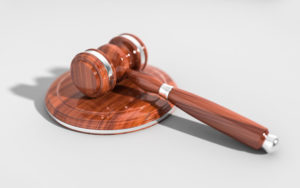By Kevin Tam
We all know what it is like to get a ticket or a fine for something that we feel we didn’t deserve. I know several operators that have received fines from the liquor, health, and law enforcement authorities for questionable violations. If this hasn’t happened to you yet, just know that it’s only a matter of time before it does. Since this is inevitable, it’s vital to have a strategy in place for your next run in with them because if they catch you off guard and you say or do something stupid, that will make a bad situation even worse.
This topic is fresh on my mind because one of my good clients just got popped for a liquor license violation, in which he clearly was not in the wrong. The whole thing got blown up in the media, and I really wish he would have called me to talk before it got out there. Now that a fight between him and the authorities has broken out, some of the bad things I’m going to go over will probably start happening to him. However, because I am writing this article now as a warning to all of you, I suppose some good came out of it.
Here are four things you need to remind yourself of when you’re being accused of wrong doing by the authorities.
1.) Understand the Psychology Behind It All and WAIT Your Turn to Speak
It benefits you to try and understand the person that is accusing you and delay your response before you start defending yourself. Sometimes, the ones that are constantly accusing others of wrongdoing are doing so because they feel accused of wrongdoing by someone in their lives. Who knows, maybe the guy just got chewed out by his boss, or he got into a fight with his wife that morning. All you need to know is that the person standing in front of you is probably accusing a ton of people (not just you) and getting into arguments with people all day long.
You do not gain anything by being ANOTHER voice that is condemning, arguing, and yelling at him.
Here is the phrase that will save your ass the next time you get accused: “Maybe you’re right about this.” Now it’s important to say the word “maybe” in that phrase because you never want to admit guilt in conversation with an officer. They could be 100% wrong. But what that phrase does is remove any further need for the person in authority to explain themselves. Oftentimes, they will lower their guard. Once their guard is down, it’s your turn to speak.
If appropriate, try to pick their brain on exactly what went wrong, then explain your method on how you were taught to do things and ask them how you can do it better. It’s during THIS conversation where you try to build rapport, find things in common, and try to get on their good side. You might even be able to talk down the ticket to a warning at this point. But it’s important to follow this process.
The timing of when you speak is important. If the accuser is in an “accusing” state, they are not going to respond to any attempts to build rapport, nor will they truly listen to your reasoning for why you think this is wrong. They’ll just think you’re sucking up to get off the charge. But if you disarm them verbally and then give them the feeling of power before you speak, you increase the chances that you’ll get to speak to the person underneath the law enforcement persona, and that’s when you can use your people skills to diffuse the situation.
By understanding the psychology behind an accuser, speaking proper words, and waiting for the correct time to speak, you can handle the authorities much more effectively.
2.) Compare the cost of fighting it, vs. the cost of paying it and moving on
Don’t fight expensive battles just “for the principle.” That is a fool’s justification for the trouble they create after a fight breaks out. I know a guy that got a $2,000 ticket for an unfair liquor violation. He did nothing wrong. The inspector was just in a bad mood that day and decided to nail my friend because as the saying goes, he was in the wrong place at the wrong time. But because my friend is very stubborn, he decided to lawyer up and fight this thing in court “just for the principle.”
Lawyers are not cheap as I’m sure you know. I have paid thousands of dollars for legal counsel for things that were nowhere as time consuming as this, so I’m sure the bill was significant. Let’s just say legal fees were $10,000 for argument’s sake. Then there was also my friend’s personal time that he spent meeting with his lawyers, providing evidence, and going to court. If my friend’s time is worth $300 an hour, and he’s spending 10 hours thinking and working on this case, that’s $3,000 gone!
A $2,000 ticket seems like a bargain compared to $13,000 in legal fees and lost time. Plus, he was just a miserable person the whole time he was dealing with this thing, and I bet it probably affected his personal life too. To add insult to injury, he ultimately lost the court case. The whole thing was a complete waste of time and money.
I know it sucks when these things happen, but you have to weigh the pros and cons of fighting them. Sometimes, it’s better just to pay the thing and move on with your life.
3.) Understand that all authorities know each other to some extent
Even in big cities, there are only a small group of people that work in these positions and you have to assume that they ALL know each other. Chain reactions against your interests can happen if you get in trouble with any one authoritative entity. If you piss off the police because there are reports of gunshots outside of your bar every night, it’s not hard for them to call their friends in the fire department, the health authority, or any other entity that grants you to a license to be in business and make your life a living hell.

One of my friends did not get his liquor license renewed by the liquor board due to a bogus reason. However, leading up to his renewal, there were tons of fights outside his bar that required a constant police presence. I also know how difficult he can be to deal with when things don’t go his way and how argumentative he was with the police. Now, I have no evidence to suggest that the police called the liquor board and said not to grant him a renewal, but it’s not hard to believe that they could if they wanted to. He ultimately had to shut that bar down and move to another location.
While in theory, separate branches of government agencies are supposed to operate independently and transparently, in the real world, people can easily call up their colleagues, talk shop, and call in favors. You do not want to make enemies with any of these people. Doing so has the potential to attract unwanted attention in other areas where the authorities are involved.
4.) Let go of your resentment for them, and instead try to befriend them
While I understand people’s loathing of government authorities, it does not help you to harbor resentment towards them. Befriending them is a much better alternative. Let’s face it, you need them in order to be in business. If internally you hate the rules they make us follow and hate the people that work for them, you’re only hurting yourself.
I know people who have lost their temper and sworn at tax agents on the phone. I also know other people that get very uncomfortable around police, who automatically tense up and become defensive whenever coming face-to-face with an officer. This is not wise.
Remember the person you’re dealing that represents a government authority is not the government. They are a person that has a government job. If you see it from that dynamic, you give yourself space to approach the situation from the human side of the interaction.
I have talked myself out of all kinds of problems with government authorities by remaining humble when being accused and trying my best to befriend my accuser. In some cases, the person reprimanding you can end up being your ally later on down the road when you are trying to resolve the situation.
Kevin Tam is a Sculpture Hospitality franchisee with over a decade of experience working directly with bar, restaurant, and nightclub owners on all points of the spectrum. From family-owned single bar operations to large companies with locations on an international scale, Kevin works with them all and understands the unique challenges each kind of company faces.
He is the author of a book titled Night Club Marketing Systems – How to Get Customers for Your Bar. He is also a regular writer for Bar & Restaurant, and publisher of an eBook called: The 5 Commonly Overlooked Areas That Kill Your Food Cost.








